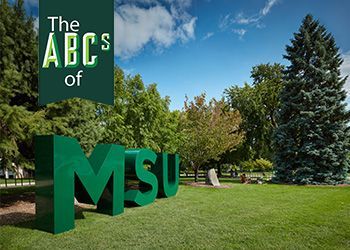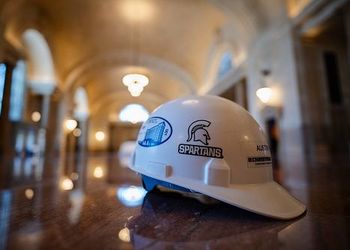Sports: Spartans Win the 2000 National Championship

Tom Izzo and Mateen Cleaves lead MSU to basketball supremacy as Spartans everywhere savor the monumental achievement.
Guts and glue. Loyalty, family and commitment. Leadership. Mental toughness. A lofty dream, followed by years of tireless and intelligent effort to make it come true. Those themes emerged from MSU’s exciting run to the 2000 NCAA basketball championship—one that captivated the hearts of an entire community, and indeed, a nation. On April 3, MSU beat Florida 89-76 before 43,116 fans in the RCA Dome, Indianapolis, to win the national crown—the first Big Ten squad to do so since 1989. It did so in dominant fashion, becoming the first team ever to win all six tournament games by double digits.
MSU is now the only Div. 1-A school in NCAA history to post a “double double”—at least two national titles in football (1952, 1965, based on the major writers or coaches polls) and in basketball (1979, 2000). Make that a triple double—MSU also won two NCAA hockey titles (1966, 1986).
The heroes of this storybook tale include a Yooper—two-time “National Coach of the Year” Tom Izzo, who hails from Michigan’s Upper Peninsula—the Flintstones, the Ohio Players, and a supporting cast from many parts geographically united hematogenously by green.
When Izzo took over five years ago from longtime mentor Jud Heathcote, he set his sights on hoopsdom’s Mt. Everest. He envisaged a Duke-like program—one that would challenge for national supremacy every year, one loaded with exemplary student-athletes. After he recovers from a sleepless celebration with his family and best friend Steve Mariucci, coach of the San Francisco 49ers, and after he returns from a long overdue Caribbean cruise with wife Lupe and daughter Racquel, Tom will suddenly realize that in the past two seasons—with back to back Big Ten titles, Big Ten tournament titles, Final Four appearances, and a national title—MSU may have overtaken Duke as the premier basketball program in the land.
Izzo remains the humble guy-next-door. Born to a blue collar family, he doggedly sought his first MSU job as a grad assistant earning $7,000 a year. His is a story in the mold of Horatio Alger, and in reaching for his dream, he made ample room for all Spartans to enjoy the quest with him. This climb to basketball’s summit was executed by a bunch of players, systematically assembled, who reflect Izzo’s values, toughness and emotional bonds. They bought into his system, which stresses team goals and effort-related goals like defense, rebounding and toughness. Helping Izzo manage the group were assistants Brian Gregory, Stan Heath, Mike Garland, and video expert Dave Owens. Gus Ganakas provided Izzo’s link to MSU tradition and history.
Epitomizing Izzo’s philosophy was Mateen Cleaves, a charismatic point guard whose smile was reminiscent of Magic Johnson. A two-time Big Ten MVP, Cleaves had an opportunity to turn pro last year. He, along with fellow senior and “Flintstone” Morris Peterson, came back for one corny reason—to lead MSU to the national title so he could bask in his favorite piece of music, “One Shining Moment.” “I could have taken the money, but no amount of money in the world can buy this,” said Mateen, pointing to the Sears Trophy, a $30,000 Waterford crystal ball emblematic of the championship, on the steps of the Michigan Capitol two days after the win. “You have to earn this.”
The tears that streamed down Cleaves’s cheeks as he and Tom embraced oncourt while CBS showed its musical montage reflected how much sweat each had poured into this conquest. Mateen, as Izzo’s surrogate on the court, helped create the chemistry and provide the “guts and glue” that was necessary for this team to succeed. And when success drew nigh, Mateen reacted with pure, unadulterated joy, doing an impromptu dance at game’s end that momentarily seemed to erase the pain of his second-half high ankle injury. “Oh my God! This is what I came back for!” exulted the winner of the Final Four’s MVP award.
“This guy’s got the heart of a lion, and he’s worked for this for four years,” Izzo summed up.
Leadership. Of all of Mateen’s great athletic skills, none match his intangible ability to impart a refuse-to-lose mentality. Whether he patted someone at opportune times or berated them during halftimes, at times using non-church language, he inspired the team to clutch comebacks during the tournament—against Utah in Cleveland, and in two rousing regional games at the Palace of Auburn Hills, where MSU made Lazarus-style comebacks and outscored Syracuse 17-0 and Iowa State 20-3 at game’s end. No one could deny the Spartans at “money time.”
Mental toughness. It’s one thing to play loose, with nothing to lose. It’s another when wearing the favorite’s yoke. After its consensus preseason No. 1 ranking, MSU played with “a bullseye on our backs,” as Izzo put it. Although the players boast physical toughness, as evidenced by practices with football pads and their survival of the “war” drill, it took mental toughness to survive the entire season and go 32-7, with a 10-game win streak through the Big Ten tournament and the NCAAs. Mental toughness allowed MSU to survive the toughest regional bracket, the Midwest, with a gauntlet of conference champs (Mountain West, Big East, Big 12) awaiting in Cleveland and Auburn Hills. Morris Peterson exemplifies mental toughness, saving his best for the second half when things really mattered. Who in Breslin could forget his trey to tie Indiana at the buzzer? In the tourney, his many clutch shots and key rebounds showed why he was voted Big Ten MVP. His second half production in the NCAAs was astonishing—75 of 105 points scored, including 13 of 18 against Iowa State and 16 of 21 against Syracuse. In the finals, after the death of his beloved grandmother, Peterson’s rainbows seemed to follow ethereal arcs into the net.
Family values. Success springs from a solid foundation, and Izzo has built his program on a bedrock of family values. He’s a product of Iron Mountain—“11 months of winter followed by one month of sledding,” he notes—where the work ethic prevails and where backbones are as solid as the copper and tin once found in local minefields. The Flintsones—Cleaves, Peterson, and junior Charlie Bell—and their families boast tremendous bonds of friendship, unselfishness, work ethic, and loyalty to their home town, Flint, and their alma mater. They’re about team success, not individual stats. Bell, an offensive machine who set the all-time Flint scoring record, was content to specialize in defense and rebounding, and as playmaker during Mateen’s injury, to help the team. “I learned how to love my family growing up,” explains Izzo, whose brand of tough love helped cement the team. “I believe that’s why we’ve got a good basketball team. Our guys care for each other.”
The unsung branch of the MSU family are the “Ohio Players”—Granger and junior center Andre Hutson, two classic quiet achievers. These two essential pillars of MSU’s success performed consistently and magnificently without drawing undue attention, although that might change with their championship rings. Also unsung was MSU’s bench of Mike Chappel, David Thomas, Al Anagonye, Jason Richardson and Adam Ballinger. They each made solid contributions towards the end result.
The “MSU family” extends to the coaching staff, the parents, the managers, the support staff, including the academic support staff, and to the thousands who packed the pep rallies at the World Mardi Gras in Circle Center Mall, the major donors reception at the Indianapolis Historical Society, and the postgame party at the Indianapolis Convention Center, courtesy of MSU Development, the MSU Alumni Association, and the Rebounders Club.



